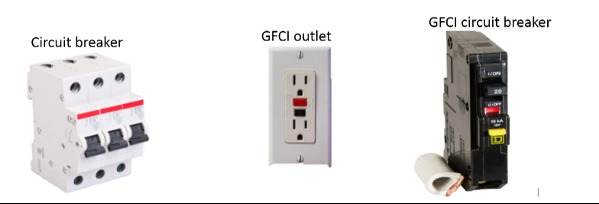
Circuit breakers and GFCI outlets are two safety or protective devices designed to prevent electrical hazards in your homes. While they have some similarities, they serve different purposes and operate in different ways.
Understanding the difference between gfci and a circuit breaker can help you choose the right safety switch for your electrical system. Ensuring the safety of your device and home.
What Is a Circuit Breaker?
A circuit breaker is an electrical device designed to switch off power supply when there is overload, short circuit, or power surge. It is an electrical switch that protects the circuit and appliances from faulty current.
Circuit breakers are installed in a panel box, also known as a breaker box or electrical panel, and are connected to the circuit wires coming from the main power supply.
When an electrical current flowing through the circuit becomes too high, it trips or opens, and interrupts the flow of electricity.
This prevents the circuit from overheating and potentially causing electrical fire.
What is a GFCI?
The GFCI (Ground Fault Circuit Interrupter) is a type of breaker designed to shut off electric power when there is ground-fault.
Ground faults occur when an electrical current escapes its intended path and flows through the ground. This can happen if there is a break or malfunction in the electrical wire or cord.
A ground fault can cause an electrical shock if someone touches the conductor carrying the stray current.
The work of a GFCI is to monitor the circuit and interrupt the power when there is current leakage. It constantly monitors the amount of current flowing through the circuit and compares it to the one returning to the breaker panel.
If it detects a difference between the two, it assumes that there is a current leak and thus trips the circuit.
There are two types of gfci:
- GFCI receptacle or outlet: This protects only the appliance connected to it
- GFCI circuit breaker. It offers gfci protection to the entire electrical system.
GFCI receptacles are usually installed in locations where there is a risk of electrical shock, such as in bathrooms, kitchens, and outdoor outlets. They are also required in certain areas of a home by the National Electric Code (NEC), such as in damp or wet locations, or where electrical appliances are used near water.
Difference between circuit breakers and ground fault circuit interrupters (GFCI)
| Circuit breaker | GFCI |
| Circuit breakers protect an electrical circuit from damage due to an overload or short circuit. | GFCI protects against ground fault |
| Circuit breakers are installed in a panel box and are connected to the circuit wires coming from the main power supply | GFCIs can be installed in outlets, receptacles, or as circuit breakers. |
| Circuit breakers are designed to protect against overheating and potentially starting a fire | GFCIs are designed to protect against electrical shock. |
Difference between GFCI circuit breaker and GFCI outlet receptacle
| GFCI circuit breaker | GFCI outlet/receptacle |
| GFCI breakers are installed on the main breaker panel | GFCI receptacles are installed into electrical outlets |
| Offers gfci protection to the entire house | Protect only the appliances connected to it |
| You can reset it from the breaker panel | You can reset the gfci outlet using the reset button on the outlet faceplate |
| More expensive | Less expensive |
Is it OK to replace a GFCI breaker with a regular breaker?
No, it is not OK. Replacing a gfci with a regular breaker is a code violation and you won’t get gfci protection.
The two breakers serve different purposes. While a GFCI protects humans against electrocution, it does not protect against other types of electrical hazards, such as overloads or short circuits.
Therefore, it is important to have both a circuit breaker and a GFCI in your electrical system
How do I know if my circuit breaker is GFCI?
You will know the gfci outlet by looking at the face-plate, the outlet usually has a test and reset button.
Can I use a GFCI breaker instead of an outlet in a bathroom?
You can use any of the breakers to achieve shock protection, it all depends on your needs and code requirements.
The gfci circuit breaker protects the entire electrical system from ground faults, while a gfci outlet protects a few outlets.
Related articles